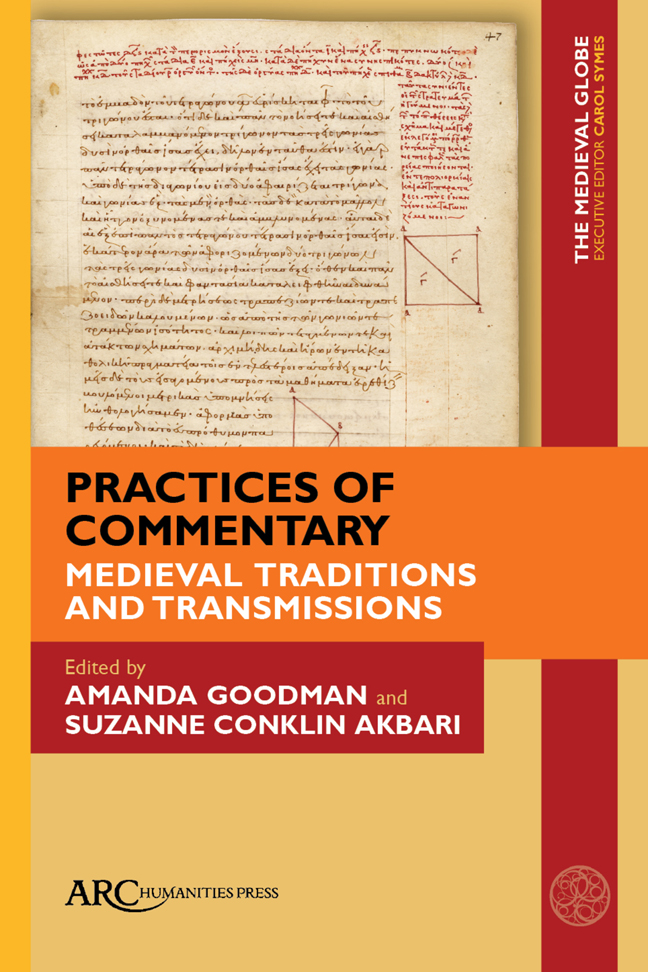Book contents
- Frontmatter
- Contents
- List of Illustrations
- Introduction: Commentary at the Crossroads
- Graeco-Roman Commentary Beyond Alexandria: Problems and Prospects
- From Plane to Space: The Narrative Arc of a Byzantine Mathematical Manual
- Periodization in the Sunni Qur'an Commentary Tradition: A Chronological History of a Genre
- On the Practice of Autocommentary in Sanskrit Sources
- Oral Commentaries and Scholarly Debates in Sanskrit Philosophy
- On the Nature of Chinese Buddhist Scriptural Exegesis: Observations on the Commentaries of Chengguan, Woncheuk, and Other Sui-Tang Exegetes
- The Mise-En-Page of a Sino-Tibetan Dunhuang Manuscript: Yuanhui's Commentary on the Laṅkāvatārasūtra
- Commentary and Multilingualism in the Ottoman Reception of Texts: Three Perspectives
- Index
Graeco-Roman Commentary Beyond Alexandria: Problems and Prospects
Published online by Cambridge University Press: 17 February 2024
- Frontmatter
- Contents
- List of Illustrations
- Introduction: Commentary at the Crossroads
- Graeco-Roman Commentary Beyond Alexandria: Problems and Prospects
- From Plane to Space: The Narrative Arc of a Byzantine Mathematical Manual
- Periodization in the Sunni Qur'an Commentary Tradition: A Chronological History of a Genre
- On the Practice of Autocommentary in Sanskrit Sources
- Oral Commentaries and Scholarly Debates in Sanskrit Philosophy
- On the Nature of Chinese Buddhist Scriptural Exegesis: Observations on the Commentaries of Chengguan, Woncheuk, and Other Sui-Tang Exegetes
- The Mise-En-Page of a Sino-Tibetan Dunhuang Manuscript: Yuanhui's Commentary on the Laṅkāvatārasūtra
- Commentary and Multilingualism in the Ottoman Reception of Texts: Three Perspectives
- Index
Summary
THIS ARTICLE EXAMINES practices of commentary in Graeco-Roman antiquity and their dominant receptions in modern and contemporary scholarship. We consider philological activity based primarily in Alexandria and Rome from the third century bCe to the fifth century Ce and concentrate on the so-called Alexandrian mode of commen-tary, especially that associated with Aristarchus of Samothrace (ca. 216–ca. 145 bCe), which has occupied a preeminent place in studies of ancient commentary. In the process, we highlight alternative commentarial modes that have been relegated to the margins in mainstream accounts, precisely for their departure from the chief strategies associ-ated with Alexandrian literary critical practices. We contend that both ancient schol-ars and modern classicists have, for debatable reasons, privileged these Alexandrian (or Aristarchan) practices of commentary while perpetuating the suppression of other styles of scholarship that circulated in antiquity, late antiquity, and the medieval period. Our aim is to illuminate some of the processes and prejudices that have informed these scholarly choices and to investigate the conditions under which understandings and practices of commentary became so centred around Alexandria. Interrogating one of the most tenacious master narratives about ancient Greek and Roman commentary will uncover the norms and categories of analysis that have long guided understandings and practices of commentary in Classics and in adjacent fields.
Graeco-Roman Commentary: An Overview
Classicists have construed the philological activity of the Alexandrian scholars as the pinnacle of ancient classical scholarship, as well as the fons et origo of modern literary criticism in its ideal form. As Franco Montanari observes: “Although much progress still remained to be made, and Wolfian scientific philology, the modern critical edition and the scientific commentary were still in the distant future… a nodal step had been taken in the period from Zenodotus to Aristarchus.” The preeminent historian Peter Fraser, moreover, remarks that “the main feature of post-Aristarchean scholarship is the enor-mous influence which Aristarchus’ work continued to exert.”
Alexandria's reputation as the centre of erudition par excellence has rested on the fame of its library, which operated under Ptolemaic patronage and attracted intellectu-als across the Greek-speaking world who wished to gain access to its scholarly commu-nity and vast collections of books. The copying, correcting, interpreting, and canonizing of Greek literature, not only of Homer but also of other archaic and classical writers (ca. seventh to fourth century bCe), received the greatest attention there.
- Type
- Chapter
- Information
- Practices of CommentaryMedieval Traditions and Transmissions, pp. 9 - 28Publisher: Amsterdam University PressPrint publication year: 2023



